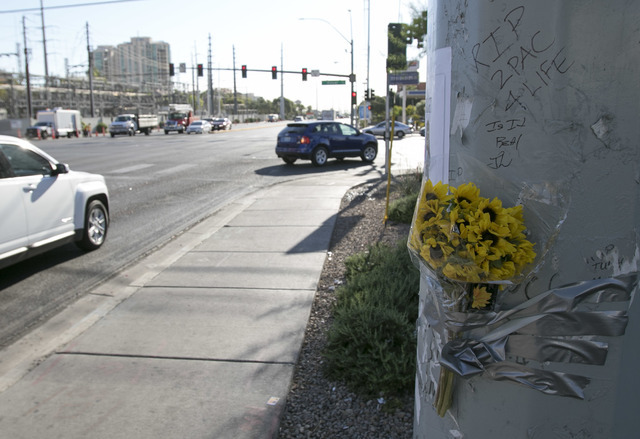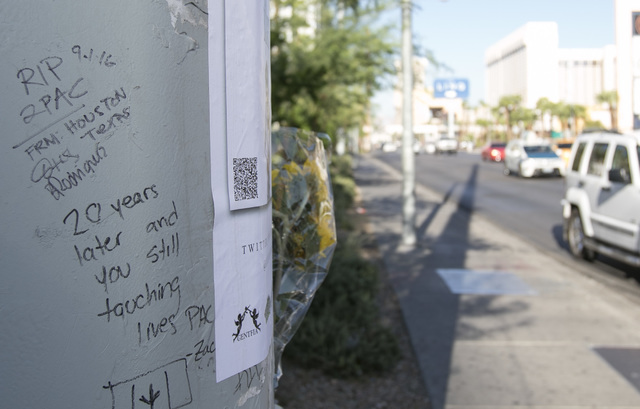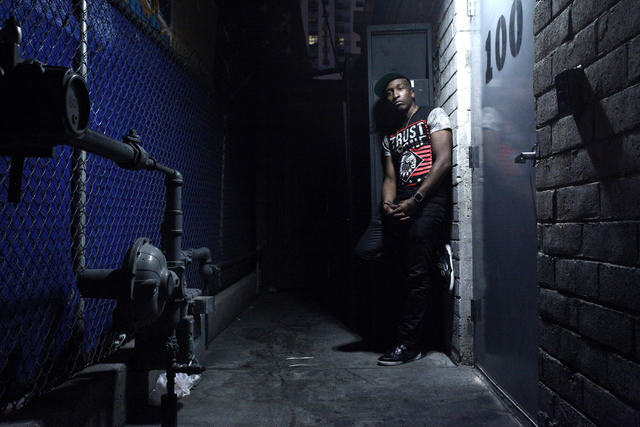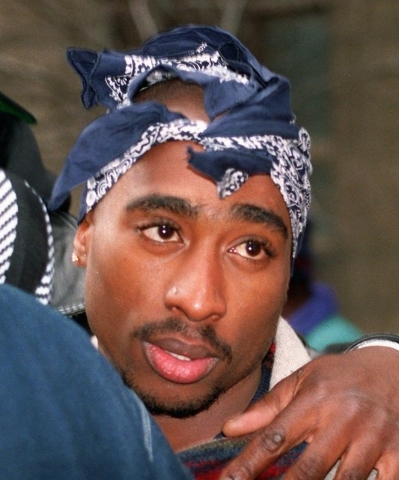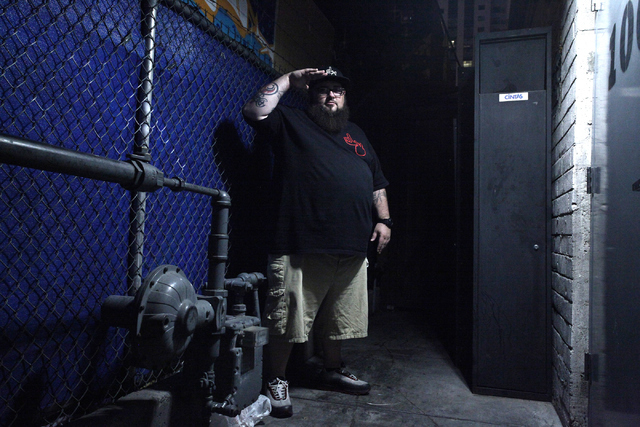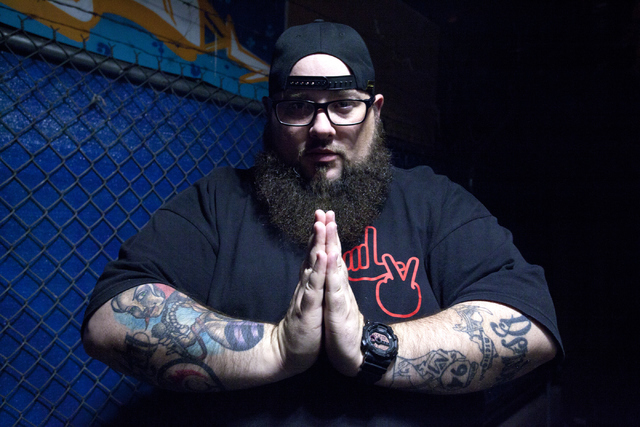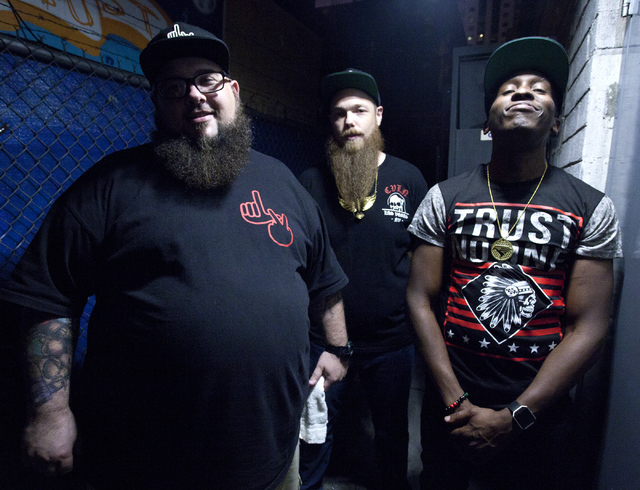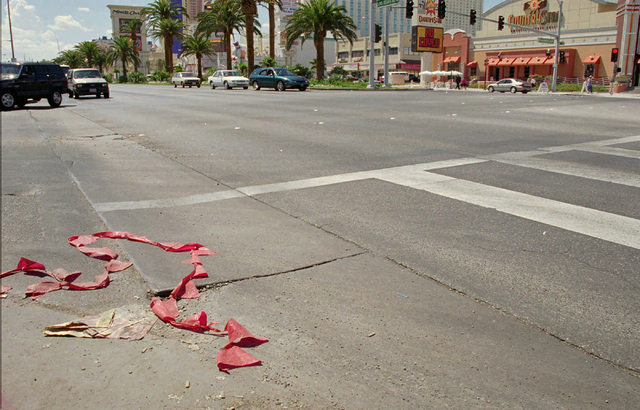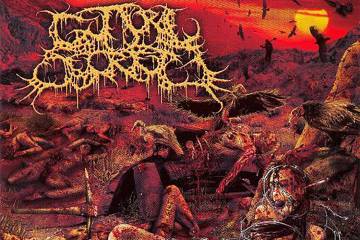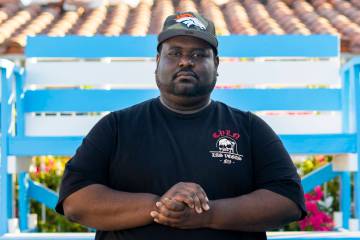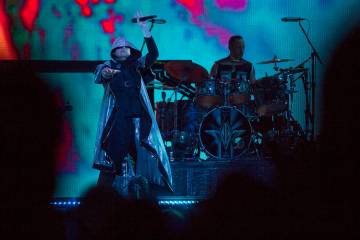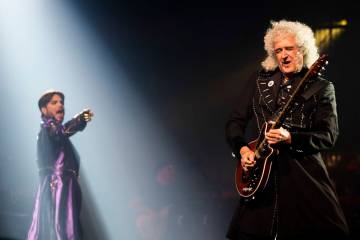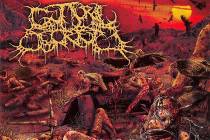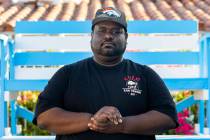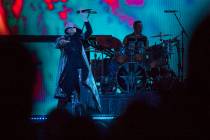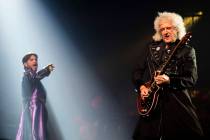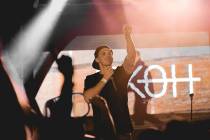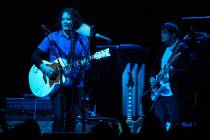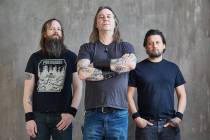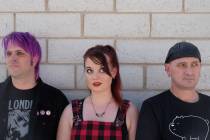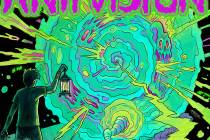20 years after his death in Las Vegas, Tupac Shakur lives on
The fence he speaks of no longer stands, gone with it all the flowers threaded through its links, the homemade memorials torn from the pages of magazines.
A new barricade has since been erected on the vacant lot behind the Flamingo, guarding acres of weeds, but old memories linger.
“People would put stuff up on it, pictures, collages,” recalls Mikey Porter, eyeing the area where said fence once stood from a Shell gas station across the street. “They’d light candles.”
When Porter — a longtime Vegas hip-hop scene fixture who goes by the name Mikey V.I.P. — has a DJ or MC gig at the House of Blues or the Hard Rock Cafe on the Strip, he makes a point of driving by this spot.
“Every time I cross Koval and Flamingo,” he says, facing the intersection in question, “I say ‘peace’ to him.”
Porter didn’t know “him” personally, never had any one-on-one time with Tupac Shakur, but he felt like he did — as did the half dozen other rappers and DJs who flank Porter on a recent evening.
As did millions.
This is one of the reasons why, 20 years after Shakur passed away following a drive-by shooting at this very location — a crime that remains unsolved — he still is an indelible figure in hip-hop, a firebrand, a chameleon, a clenched fist, a genre’s id and superego at once.
Two decades ago on Sept. 13, Shakur died.
In hip-hop, though, he lives on.
Shakur’s voice, booming as it was, still reverberates in the music of today. You hear it in Kendrick Lamar’s mixture of defiance and uplift, in J. Cole’s hard-boiled narratives, in the wildest of Eminem’s mood swings.
Mostly, though, you hear it in the way that even the most hardened of rappers are no longer wary of dropping their guard a bit, of mining emotions other than anger and frustration, for fear that it may somehow undermine their masculinity.
Shakur was certainly capable of serious menace, an unhinged presence at times, hard as the asphalt layered upon the mean streets of his native New York City. He once went to prison for sexually abusing a fan and did numerous stints in jail for assault.
That Shakur was a great musician certainly doesn’t obscure the fact that he wasn’t always a great person.
Despite his missteps, however, Shakur’s repertoire was largely bent on the betterment of his people.
He was a socially aware hard case, who once urged his peers to stop using “bitch” as a synonym for “woman” in song, who penned hip-hop’s most heartfelt, enduring ode to mothers (“Dear Mama”). On “Wonder Why They Call U,” he urged women to define themselves independently of men (“Keep your mind on your money, enroll in school / And as the years pass by, you can show them fools”). On the harrowing “Brenda’s Got A Baby,” he urged young moms to seek a better life, to not let their surroundings dictate who they are (“Just ’cause you in the ghetto doesn’t mean you can’t grow”).
In total, Shakur was a complex, conflicted character, a fighter and a thinker, a man whose knuckles and heart bled alike.
And it was here in Vegas that he was lost, shot after attending a fight by his good friend and kindred spirit Mike Tyson at the MGM Grand.
And so, it’s at the MGM Grand where we first meet Porter and the rest of his crew, MCs Phoenix Orion, Omino Jakku, Chrome and King Akeem along with DJ E-Doc, all culled from the Campfire Music collective, a deep, diverse roster of Vegas hip-hop veterans.
In the last place that Shakur hung out prior to being assailed, they gather to remember a man they say they could never forget.
Orion, in particular, has close ties with Tupac.
He grew up with Shakur in the Bronx, their families close, as both Orion and Shakur’s parents were in the Black Panthers.
“We went to a lot of schools and did a lot of teaching and lecturing together,” says Ali Lamont, Orion’s father, speaking about his relationship with Afeni and Mutulu Shakur during a well-timed phone call to his son.
Orion was there as Shakur’s star ascended, as he wrangled with the pull between being a voice for his community and indulging in an outlaw lifestyle.
“ ’Pac was struggling between being a revolutionary and being a gangster,” says Orion, a science-obsessed rapper whose trademark mohawk is tucked into a ballcap on this day. “We grew up with the same philosophies.”
Orion relocated to Vegas to pursue his music career in the ’90s, and was here the night Shakur was shot.
This was the pre-social media age, of course, and so when news of the incident began circulating around town, it was greeted with a mixture of shock and disbelief.
Jakku first heard about what happened the next morning, from a friend who was a die-hard Shakur fan.
“He woke me up and was like, ‘They shot Tupac!’ ” he recalls. “He was crying. I don’t think anybody realized what his legacy was going to be at the time, because he was just a rapper to so many people until he died. Then you realized, ‘This guy was more than just that to people.’ ”
DJ E-Doc, sporting a “Flamingo & Koval” T-shirt in memory of Shakur and a beard that would be the envy of any self-respecting billy goat, was celebrating his 12th birthday when he learned of the incident on MTV News.
“It really didn’t hit me until the next morning at school,” he says. “Everybody was talking about it. Girls were crying, even some dudes were crying. That really made me look at ’Pac like, ‘Wow, he’s having an effect on everyone around me.’ I started getting his music after that and realizing that he had an effect on so many people because he’d speak on so many different things in his songs.”
This was thing about Shakur: He meant many different things to many different people.
“In today’s world, a lot of people want to focus on the thug-life ’Pac, the hard ’Pac. But my mom didn’t give a (crap) about no thug life, and she loved Tupac,” says King Akeem, his short dreads peaking out of a baseball hat. “You’re talking about a dude who had so many facets to him. Everyone has a different Tupac that we like. We’ve all got different images of him.”
Eventually, we all travel to the scene of the crime.
Porter, who’s such an avid Shakur fan that he wrote a report on his death during his senior year at Basic High School (he got an A), recounts the events of that fateful evening.
“They turned right here,” he says, pointing to the spot on Flamingo Avenue where the car that Shakur was riding in made a U-turn after the shooting, “they made the left on the Strip and the tire blew out on the middle of Harmon.”
Orion recalls coming here for the first time after it all went down, still incredulous.
“I remember stepping outside of the car real quick, kind of shedding a tear,” he says, his voice trailing off.
The reminiscing continues for nearly half an hour.
Memories are all that anyone has of Tupac Shakur as of Sept. 13, 1996, the day he died.
Twenty years later, this block looks different.
Everything seems to come and go in Vegas, certain memories excepted.
Read more from Jason Bracelin at reviewjournal.com. Contact him at jbracelin@reviewjournal.com and follow @JasonBracelin on Twitter.



